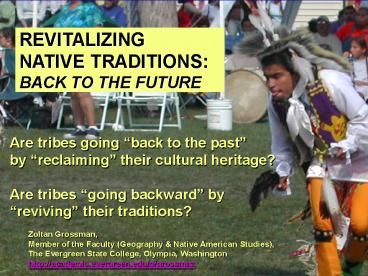REVITALIZING NATIVE TRADITIONS: BACK TO THE FUTURE - PowerPoint PPT Presentation
1 / 44
Title: REVITALIZING NATIVE TRADITIONS: BACK TO THE FUTURE
1
REVITALIZINGNATIVE TRADITIONSBACK TO THE FUTURE
Are tribes going back to the past by
reclaiming their cultural heritage? Are tribes
going backward by reviving their traditions?
Zoltan Grossman, Member of the Faculty (Geography
Native American Studies), The Evergreen State
College, Olympia, Washingtonhttp//academic.everg
reen.edu/g/grossmaz
2
Western Model of Linear Progress
Present
Future
Past
Going backward Reclaiming past
3
A Tale of Two Birds1. Chickaloon, Alaska
4
(No Transcript)
5
(No Transcript)
6
STUPIDCHICKEN
7
STUPIDCHICKEN
8
A Tale of Two Birds2. Muscoda, Wisconsin
9
Ghost Eaglein WisconsinRiver Valley
A Tale of Two Birds2. Muscoda, Wisconsin
1,300-foot wingspan
10
A symbol allegoryof Native survivaland
continuity
11
xxxxx
Continuity of stories
- Ho-Chunks
- Red Horn legend in
- Gottschall rock shelter
12
Continuity through the Dark Ages
- After suppression of Native culture
- and before modern revival
- Little awareness of Native history
- from 1890s to 1960s
Wounded Knee massacre, 1890
Wounded Knee siege, 1973
13
Continuity through the Dark Ages
- Boarding schools assimilated youth
- Reservation land allotted
- Off-reservation harvesting banned
- Religions outlawed
- Languages repressed
- Yet cultures practiced
- in secret, survived and adapted..
14
Frozen in time? Edward Curtis photoin a Piegan
Lodge, 1910
15
SpearfishingLac du Flambeau Lake of the Torch
Birchbark canoes, torches, wooden spears
State outlawed treaty spearfishing in 1908 but
Ojibwe practiced secretly
16
SpearfishingLac du Flambeau Lake of the Torch
Motorboats, halogen lamps, metal spears
Spearing rights upheld by federal courts,
re-emerges into open, 1983
17
Wisconsin Walleye Wars, 1986-92
Ojibwe treaty rights reaffirmed, 1983. Violent
backlash from many white sportfishers (Bresette/Wh
aley). Anglers protest spearing as harmful (yet
only 3 of walleye) Criticize technology as
nontraditional (not in use at time of treaty)
18
Makah whale hunting
1855 Treaty recognized centralityof whaling to
Makah sea culture.Non-Indian commercial
whalingdepleted grey whales, 1920s
(Recovery in 1980s)
1997 agreement for non-commercial Makah
harvest (5 out of 20,000 grey whales)
19
Washington Whaling Conflict, 1999
Harpoon Makahs - Not Whales (Banner at Seattle
protest)
Animal rights groups join anti-Indian groups
to protest harpooning/ shooting of one
whale. (Modern rifle brought quicker death).
20
Gaming as nontraditional?
Casinos in U.S. cash economy
21
Gunpowderand fireworksfrom the Chinese
Turn it around Western culture constantly
adopts (and adapts to) new technologies
22
Clocks from the Germans
Why do only Native Peoples have to be museum
pieces?
23
Christians?
24
Americans?
25
Right to bear arms ?
26
xxxx
Living, evolving cultures,not resurrection of
dead cultures
27
xxxx
New traditionsJingle Dance
28
xxxx
29
xxxx
Cultural Mixing
30
Grand Entry
31
Flag Song
32
Continuity of Governance Traditions (Cornell)
- Does modern tribal government
- resemble older traditional form?
- Unstable if decentralized before,
- but centralized today, etc.
- Tribes with successful economic development
followed - precolonial government form (e.g., Pueblos)
- Start of a Native Renaissance?
33
Greco-Roman Era Italian Renaissance
( Rebirth)
- Selective Revitalization (Alfred)
- Drawing from the past, but
- different from the past
34
Negation of the negation (Hegel)
Negation of past
Negation of negation
Past
Native independence
Western colonialism
Cultural revitalization
Moving forward to a reconstituted
culture (Closest idea that Western thought has to
circular Indigenous methodologies)
35
Tradition
- Not about technology but consciousness
- Not about form but substance
- Not about appearances but values
36
xxxx
Native Renaissance
Applying past values to present problems to build
a better future
37
Miners Canary analogy
By Felix Cohen, 1953 (Modern founder of federal
Indian law)
- The Indian plays much the same role in our
American - society that the Jews played in Germany. Like
the - miner's canary, the Indian marks the shift from
fresh air - to poison gas in our political atmosphere and
our treatment - of Indians, even more than our treatment of other
minorities, - marks the rise and fall of our democratic faith.
38
Greenhouse analogy
Tribes are in a position to apply their
traditional values to solve 21st-century problems
- Reservations at least partly shielded by
- tribal sovereignty, federal trust
relationship - Can grow their own forms of social organization
- and environmental sustainability
- Can develop solutions that benefit Native and
- non-Native communities alike.
39
Menominee Sustainable Forestry
Chief Oshkosh of Menominee Nation secured
reservation and its timber in 1854
40
Wisconsin Anti-Mining Alliance, 1993-2003
Mining companies threatened fish, wild rice
Sportfishing groups joined with tribes
to fight Crandon mine Two tribes defeated
plan by purchasing mine site (Midwest Treaty
Network) Continuing Native traditions
sovereignty benefited non-Indians too
41
Greenhouse analogy
Reservations as testing grounds for new ways
of relating to the land
- Sustainable Development
- Land purchases put into trust for projects
- Stables, Deer farms, Organic farms, etc.
- Tribal policies
- EPA Treatment-As-State status
- Gaming enables technical/legal environmental work
42
Greenhouse analogy
Reservations as testing grounds for new ways
of relating to people
- Development from gaming on some rezes
- Reverse migration from cities for new jobs
- Slow reversal of festering poverty inequality
- Tribal employment for local non-Indians
- (including former treaty opponents)
43
Greenhouse analogy
Not just casino money, but also cultural
resurgence
- Local cooperation
- Tribal investments in local festivals, tourism
zones - Tribal radio stations provide alternative news
- Joint emergency planning
- Tribal models
- Tribal laws precedents for new local, state laws
- Potential areas of healing /disinfecting for
society - Marking a shift from poison gas to fresher air?
44
(No Transcript)































